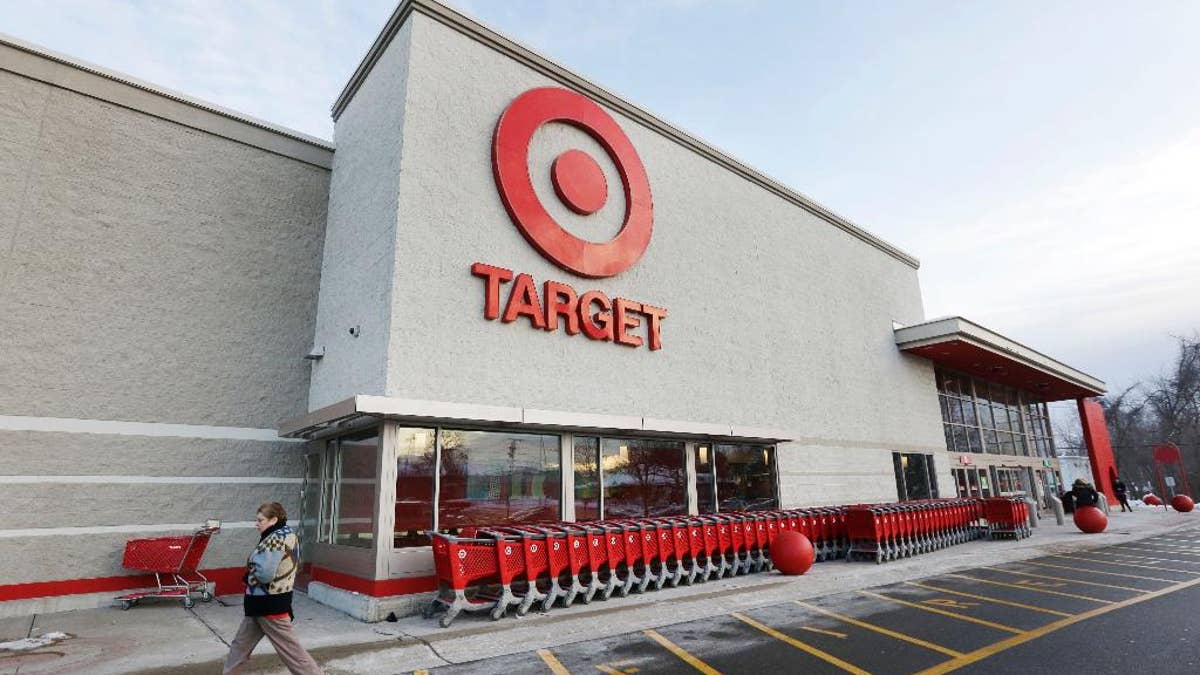
FILE - In this Dec. 19, 2013, file photo, a passer-by walks near an entrance to a Target retail store in Watertown, Mass. Target Corp. reports quarterly financial results before the market opens Wednesday, May 20, 2015. (AP Photo/Steven Senne, File) (The Associated Press)
NEW YORK – Target is hitting the bulls-eye.
The Minneapolis-based retailer reported a nearly 52 percent surge in its first-quarter profit on strong sales of fashion and baby products, evidence that its efforts to revamp its product selection are paying off.
The results handily beat Wall Street expectations on all fronts, and Target boosted the bottom end of its annual profit outlook.
Target Corp. is aiming to reinvent itself as a more nimble and innovative company and is trying to reclaim its reputation as a cheap chic retailer under CEO Brian Cornell, who took the top job last year.
Under Cornell, the company pulled the plug on its money-losing expansion into Canada so it could focus on its U.S. business, where it's made cost-cutting moves including eliminating 1,700 positions. The company told investors in March that it plans to cut $2 billion in costs over the next two years and invest money into its online operations and other endeavors.
Target is also doubling down on a handful of areas like fashion, children's products and home furnishings. It's also reimagining its grocery area and wants to focus on organic, natural, gluten-free and locally produced food.
Still, Target Chief Financial Officer John Mulligan told reporters on a call that its business is not getting too much help from an improving economy and lower gas prices. He noted shoppers are using the freed-up dollars to pay down their debts.
"They've learned a lot about the recession," he added.
Target is trying to turn its business around after losing its way during the Great Recession, when it aggressively expanded into basic groceries. That helped drive traffic but diluted its cheap chic image. The company also was dragged down by its botched foray into Canada two years ago. And Target was behind other rivals in e-commerce.
The company's first-quarter results show Target is gaining momentum.
Target said it earned $635 million, or 98 cents per share in the quarter ended May 2. That compares with $418 million, or 66 cents per share a year earlier.
Revenue rose nearly 3 percent to $17.1 billion. Revenue at store open at least year a year rose 2.3 percent, marking the third consecutive period of gains.
Mulligan told reporters that Target was able to pull back on discounts compared with a year ago, helping to boost profit margins. And Target's signature areas like fashion, baby products and health and wellness items had sales increases more than double the company average.
Target's partnership with Lilly Pulitzer created the most social media hits of Target's limited-time collections.
The collection, which ranged from floral dresses to colorful cocktail glasses, sold out within an hour at many of its 1,800 stores. It also quickly sold out online.
Online, sales surged 37.8 percent for the quarter. Target's online business accounts for 2.8 percent of total sales. To rev up growth, Target has permanently cut in half its minimum purchase to qualify for free shipping to $25.
The company's quarterly results surpassed Wall Street estimates. The average estimate of 14 analysts surveyed by Zacks Investment Research was for earnings of $1.03 per share. Zacks had forecast revenue of $17.08 billion.
The company said that it now expects earnings per share to be in the range of $4.50 to $4.65 for the fiscal year, up from the original forecast of $4.45 to $4.65 per share. Analysts were expecting $4.56 per share for the year, according to FactSet.
Target's stock rose a little more than 2 percent, or $1.78, to $77.92 in premarket trading Wednesday.
__________________
Follow Anne D'Innocenzio at http://www.Twitter.com/adinnocenzio

